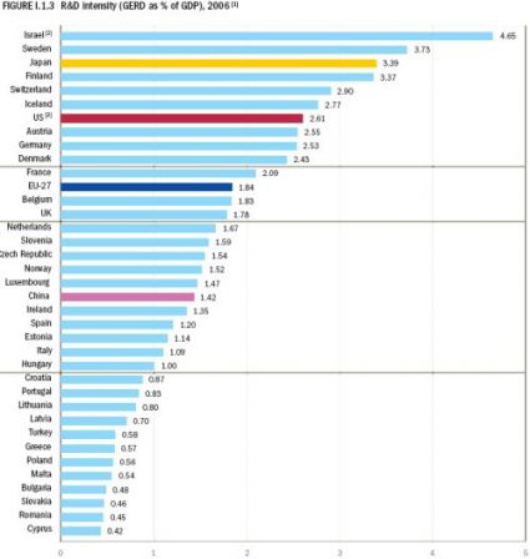Long-term innovation lag?
Published on
It is reported many times, that the countries' long-term development may only be assured by an increased support of the education and the innovation/research & development (R&D).
These days, the European Commission reviewed its latest innovation scoreboard, which outlined that unfortunately not only Hungary, but whole Europe pretty much underachieve compared to the world economic partners as well as their own pledges. The European Union set it as an aim already apropos of the Lisbon Strategy, - towards becoming the most competitive knowledge-based economy in the world until 2010 – that the member states should spend in average 3 percentages of their GDP on R&D. We are still very far from this objective, because according to the current report - based on the figures in 2006 -, the EU average is not more than 1,84 percentages. Altogether two member states may say about oneself, they accomplish the target number; of course, this time also the eminent Scandinavian countries: Sweden spent the most (3,73 percentages of GDP), in Finland this proportion is 3,37 percentages.
Hungary devoted – with a minimal increase – altogether 1 percent of the GDP on research and development; and even with this proportion we ranked in the middle tierce of the members (ten states spend even less than we do). Among the new countries – joined the EU after 2004 –, only Estonia, Czech Republic and Slovenia perform better in R&D than Hungary.
 Anyway, on the long-term, it is rewarding to spend on this area, and possibly this could be one of Hungary's breakout point – what genius are always looking for -, because where we are relative well-supplied, is the well-trained human capital. We are proud of many Hungarian inventors, our Nobel laureates with Hungarian origin; consequently it would be worth sacrificing more to R&D.
Anyway, on the long-term, it is rewarding to spend on this area, and possibly this could be one of Hungary's breakout point – what genius are always looking for -, because where we are relative well-supplied, is the well-trained human capital. We are proud of many Hungarian inventors, our Nobel laureates with Hungarian origin; consequently it would be worth sacrificing more to R&D.
Of course - realistically contemplated -, current economic difficulties can destroy these results also. It is to be feared, that government cut the R&D expenses – since they have a delayed effect – in the interest of immediate emergency rescue... preserving our lag in this field.
What there will be with you so, Europe?
Translated by Györgyi Darida
Read this article in Hungarian!



